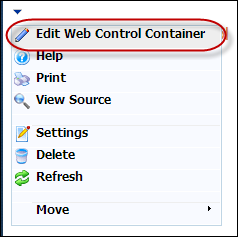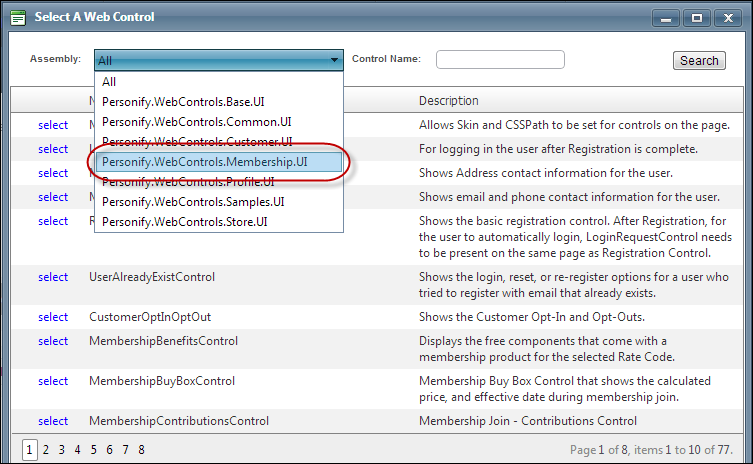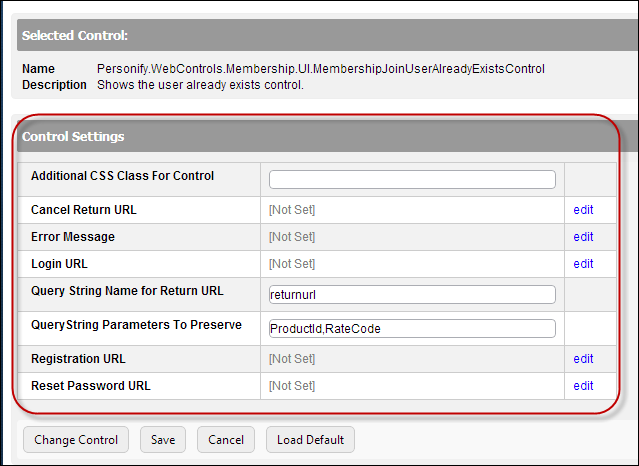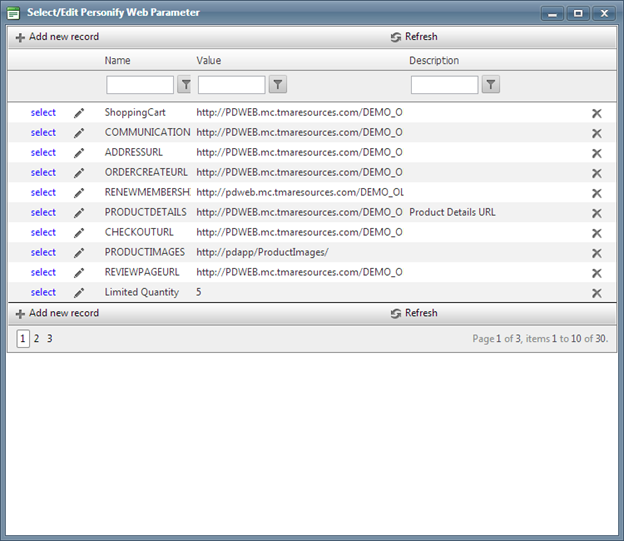
The Select A Web Control screen displays.
To configure the web settings for the User Already Exists control:
1. Log into your e-Business site as host.
2. Create
a new page on your site to add the control.
See Adding and Managing Pages for
information on how to add a page to your website.
3. Add
the Personify- DNN Web Control Container
module to the page.
See Installing .NET Controls
for more information.
4. Select
the Edit Web Control Container option from the downward arrow icon,
as highlighted below.

The Select A Web Control screen displays.
5. From
the Assembly drop-down, select
"Personify.WebControls.Membership.UI",
as highlighted below.

6. In the Control Name field, enter "MembershipJoinUserAlreadyExistsControl" and click Search.
7. Click
Select next to the "MembershipJoinUserAlreadyExistsControl",
as highlighted below.

The Control Settings for this control display, as highlighted below.

 Text
fields have a 250 character limit.
Text
fields have a 250 character limit.
8. Optional:
in the Additional CSS Class for Control
field, enter the CSS class.
This option allows you to add additional layout to the skin by developing
a new DOTNETNUKE style, which requires an advanced understanding of HTML
and CSS. See Using Skins for more information.
9. From
the Cancel Return URL line, click edit.
The Select/Edit Personify Web Parameter screen displays, as shown below.

a. Click
the select link next to the appropriate
PWF parameter.
You should set the PWF parameter to a value (e.g., MemJoinListing) that
will take the constituent to that URL in DNN when he/she selects "Cancel".If
this PWF parameter does not exist or you would like to create a new one,
see Setting up PWF Parameters for
more information.
10. Optional:
select or create a new Error Message.
The error message will display on the control for the action that was being
performed at the time of the error.
a. If left blank and the default "PersonifyErrorMessage" does not return a result, the default error message, "An error occurred while performing [Insert Action]. If the problem persists, please contact the site administrator", will display.
b. If you wish to change the default error message, customize it with a PWF parameter. See Setting up PWF Parameters for more information.
11. From
the Login URL line, click edit.
The Select/Edit Personify Web Parameter screen displays.
a. Click
the select link next to the appropriate
PWF parameter.
You should set the PWF parameter to a value (e.g., LoginUrl) that will
take the constituent to that URL in DNN when he/she logs in as a user.
If this PWF parameter does not exist or you would like to create a new
one, see Setting up PWF Parameters for
more information.
12. In
the QueryString Parameters For Return URL textbox, enter "returnurl".
This is the default name of the parameter, but if the environment's redirection
logic uses a different Query String name set it here.
13. In
the QueryString Parameters To Preserve textbox, enter "ProductId,RateCode".
This is the default name of the parameter, but if the environment's redirection
logic uses a different Query String name set it here.
14. From
the Registration URL line, click edit.
The Select/Edit Personify Web Parameter screen displays.
a. Click
the select link next to the appropriate
PWF parameter.
You should set the PWF parameter to a value (e.g., MemJoinRegisterURL)
that will take the constituent to that URL in DNN if his/her email is
already in the system and he/she wants to register using a different email
address.If this PWF parameter does not exist or you would like to create
a new one, see Setting up
PWF Parameters for more information.
15. From
the Reset Password URL line, click
edit.
The Select/Edit Personify Web Parameter screen displays.
a. Click
the select
link next to the appropriate PWF parameter.
You should set the PWF parameter to a value (e.g., ForgotPasswordURL) that
will take the constituent to that URL in DNN if he/she forgot his/her
password.If this PWF parameter does not exist or you would like to create
a new one, see Setting up
PWF Parameters for more information.
16. Click Save.